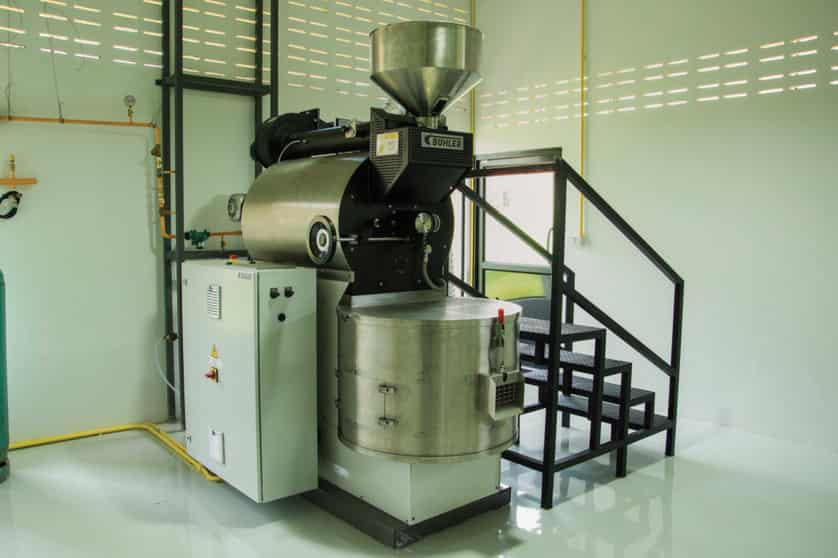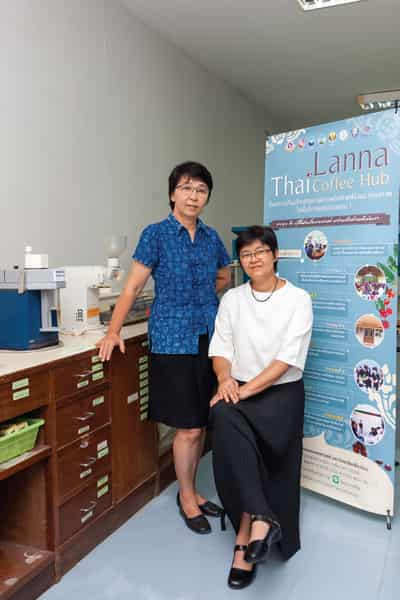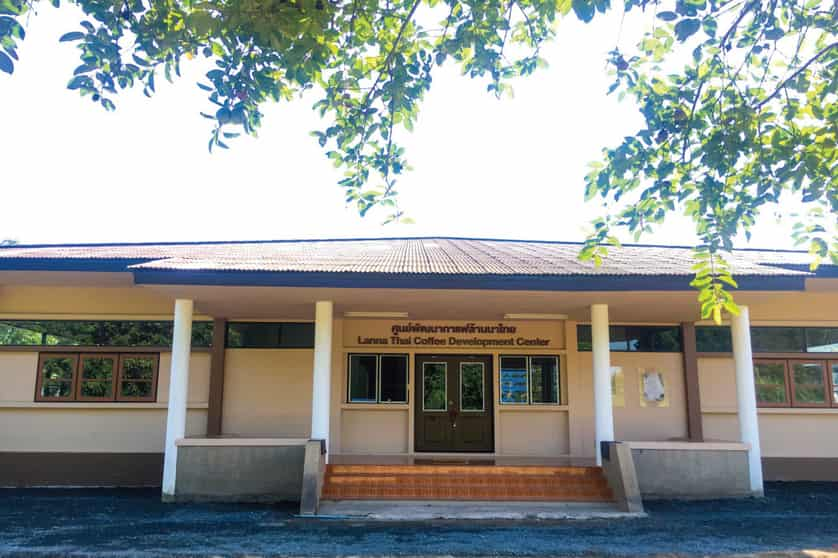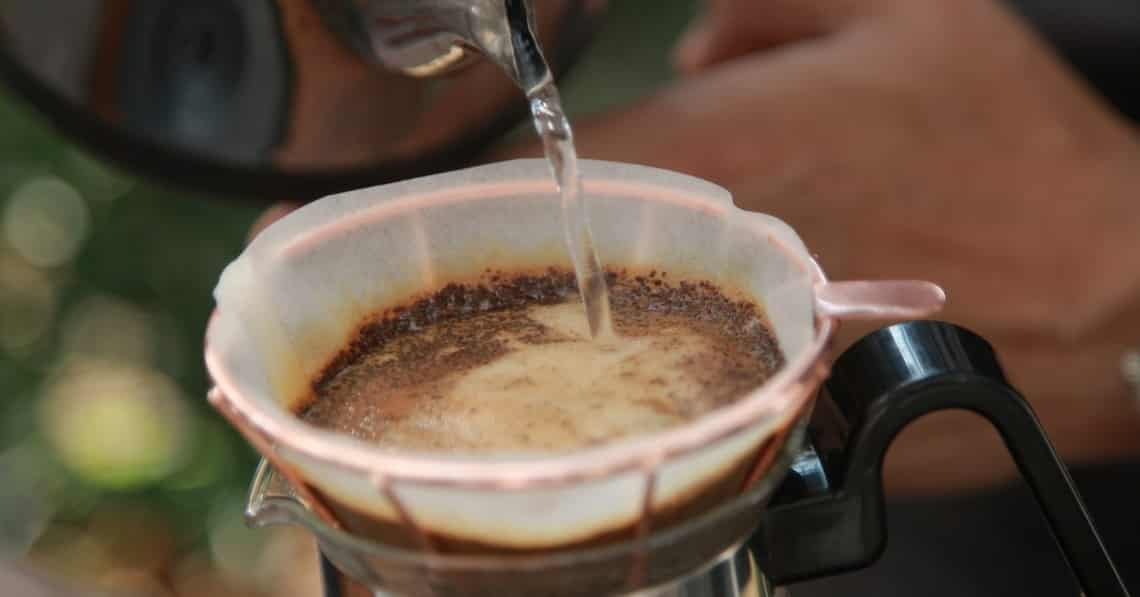It was just over a generation ago when the mountains of the north of Thailand were peppered with opium fields. The efforts to eradicate opium growth by not just Thai, but international groups, have shaped much of the growth and development of the region.
“In those days there were so many agencies and nationalities here in the North working with us to eradicate opium,” said Asst. Prof. Dr. Yaowaluk Chanbang, of the Faculty of Agriculture, Chiang Mai University who is currently the head of the Lanna Thai Coffee Hub Project. “I was young and just starting off and we were working with the UNDP and other UN agencies as well as groups from the Danish, German, Dutch and all sorts of other nations, who were all here to help us to find ways to replace opium with more valuable crops, and also improve the socio-economic status for those communities.”

It was the seventies, and the mountains of the north of Thailand were virtually inaccessible, which meant that most crops were unable to reach the markets. “When His Majesty the late King made the suggestion to try growing other crops, then coffee was seen as an attractive alternative,” continued Dr. Yaowaluk. “Coffee was something that could be stored and transported without losing its value. Though Thailand wasn’t a coffee drinking nation, sweetened coffee was gaining in popularity after being introduced following WWII. But the coffee was very expensive, leading to it being mixed with such ingredients as ground rice, corn and even tamarind seed, with sugar caramel and margarine used to enhance the colour and aroma.”

“It was the massive Amazing Thailand campaign by Tourism Authority of Thailand (TAT) in 1998 that really showed us the potential of our coffee,” explained Patchanee Suwanwisolkit, advisor of Lanna Thai Coffee Hub. “So many tourists from all over the world came and they were drinking (roasted and ground) drip coffee, at the time only found in luxury hotel lobbies. During the time where various international cafés arrived in Thailand, it was suddenly the thing to be seen sitting with your nose in the air sipping a hundred baht cup of coffee. Demand increased immediately.”
Dr. Yaowaluk and Patchanee have been working at the Chiang Mai University’s Faculty of Agriculture for decades, both primarily in the field of coffee. In their early days, they supported the opium eradication efforts of the Royal Project, and once it was established that coffee was a viable replacement crop, they then conducted years of research and development in support of farmers as well as working with Thailand’s coffee businesses to help grow the industry.
“I remember when Nimmanhaemin Road was the place where the first coffee shops opened because it was still underdeveloped as a business area,” added Patchanee. “Today we suspect there are over a thousand coffee shops in Chiang Mai, Lamphun, Lampang and Mae Hong Son.”
In fact, there are currently 30,000 rai (4,800 hectares) of coffee in the four mentioned provinces, producing about 50% of the north of Thailand’s Arabica output each year, totalling around 3,900 tonnes or 40% of the northern output. The current domestic demand for coffee is around 8,000 tonnes each year, which the north just about meets.
Having seen the exponential growth of Thailand’s coffee industry and its potential for northern farmers, the Faculty’s team approached the government and this year the Faculty of Agriculture received a 95 million baht funding from the government to create a Lanna Thai Coffee Hub. This project had the stated aim of developing the coffee industry in the four provinces mentioned and the project was set to run between April and September of this year.
“Our aim for this funding was wide and ambitious in scope, but we are happy to report that we are now at around 80% completion on all our targets,” explained Dr. Yaowaluk. “The first step was to create a network which we did by pooling all of resources and connections generated over the past 30 years. With all the data we saw the big picture and identified the areas for improvement. With around 6,000 farmers working in the coffee industry, we reached out to them and came up with a plan to support and help them. Coffee is not native and there are so many steps from the moment the seed is planted to the final flourish of the latte art — with each step adding more and more value. Our first priority was to educate and train the farmers on how to improve yield and quality, so we dispatched experts in insects, soil, diseases and other relevant areas and held multiple workshops. We also found that farmers lacked technical knowhow. For instance how to remove the pulp, mucilage, parchment and reduce damage in the washed process, and how to properly dry and store beans. With each step done correctly, the farmer can generate more money through added value. If farmers can learn to produce clean beans with no contamination, then they can really make a good living. The challenge was standardising the small farms, so we set up numerous workshops and have so far trained nearly 3,000 farmers.”
With only six months set for this heavily funded project, the faculty had to move fast and soon set up a one stop service facility in Chiang Mai, a Lanna Thai Coffee Development Center where anyone interested can come for advice and training. “This centre is staffed with experts who are there to support any farmers’ needs; so if someone brings a handful of problematic beans, we will identify the issues and offer solutions, whether it is that the bean’s storage was poor or that it was infested with insects. One of the biggest problems is that farmers don’t actually drink coffee, so they don’t understand how slight problems can affect consumer demand and pricing. To this end, we will be holding numerous workshops for farmers to learn how to improve the quality of their coffee.”

The end game is to grow the industry, and the Lanna Thai Coffee Hub sees the potential of increasing the coffee’s end value. They therefore offer support for business startups in terms of branding and marketing, even going so far as helping coffee shops train baristas and managers. So far 400 new baristas and entrepreneurs have been educated and trained by Lanna Thai Coffee Hub.
“We help them to understand that it isn’t just about the bean,” explained Patchanee, “it is the entire experience. Why do some of my students eat a bowl of noodles at the canteen but then sit at cafés with an expensive cup of coffee? It is because of wifi, Instagram, air-conditioning. These are basics many startups don’t consider.”
Other efforts include working on business matching which mainly focuses on encouraging farmers to form community enterprises, with 17 such enterprises have started up this year so far. Once they come together, they create standards and have more power to enter the market with confidence. With various matching initiatives Dr Yaowaluk and Patchanee say that Lanna Thai Coffee Hub has successfully matched 124 businesses.
“We are now at the marketing stage and we have put our data online with an app that is easy to use and filled with important and useful resources.”
The Lanna Thai Coffee Hub project believes that it is going to see a full return on the government’s investment. With approximately 200 kgs of coffee beans produced per rai per year, extra steps taken by farmers through intense trainings is expected to yield an extra 100 kilograms per rai which would mean an extra 60 million baht per year will be generated for farmers alone. This isn’t factoring in added value at each step as farmers learn to store, clean, process and roast beans as well as the income which will be generated by the hundreds of baristas and coffee shop owners who have received help and training by the Hub.
So far an extra 100 rai of coffee has been planted this year and the project has extended it working period to March of 2018 in hopes of reaching an even wider audience of potential people interested in the coffee industry.
“For three decades we have been in the background quietly supporting all sectors of the coffee industry,” said Dr. Yaowaluk, “We think that we can claim expertise in this matter and so we asked the government to fund us so that we can be even more effective and help to generate even more income and better the quality of life for many of our northern farmers and entrepreneurs.”
CMU Coffee
“We, as a faculty, began to sell roasted and grounded coffee products decades ago. We started at 250 baht per kg and the early years sold around 500 kgs per year. Today we are selling between 10-20 tonnes! The coffee beans are from our research plantations and our networking growers and the money made goes towards the maintenance and staffing of these farms and supporting relevant research and training programmes too.”
You can order the CMU coffee and support their continued works at The Highland Research and Training Centre, Faculty of Agriculture, Chiang Mai University.
